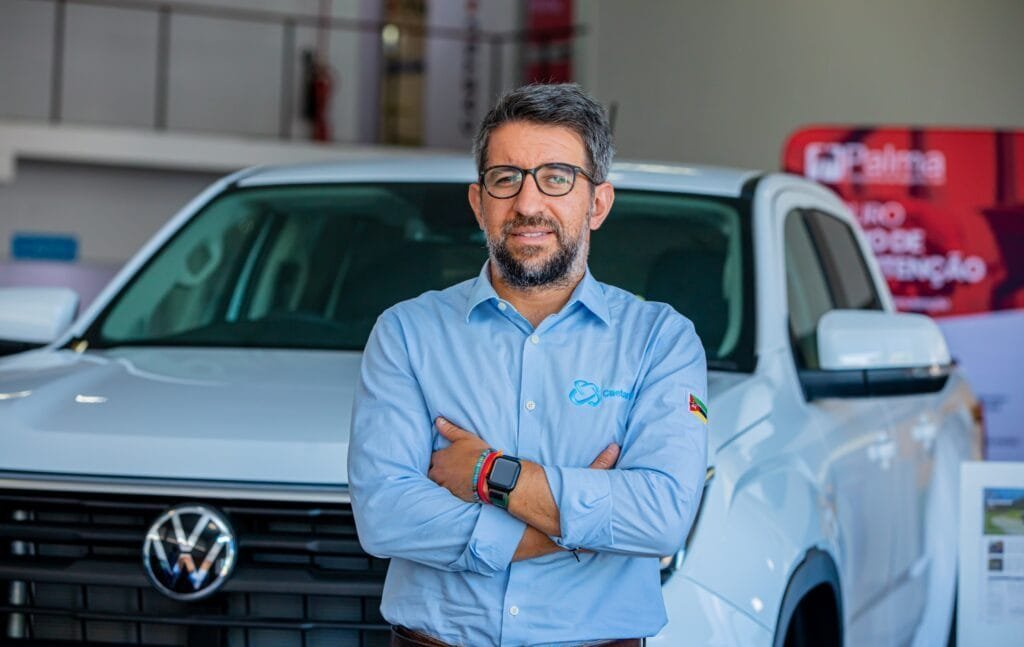Profile Mozambique: Caetano Mozambique is a benchmark in the national automotive sector and is part of the prestigious Salvador Caetano Group. To begin, could you give us a brief overview of the company’s history in Mozambique and its main milestones?
Nelson Melo: Caetano Mozambique is part of the international Salvador Caetano Group, which operates across three continents and in 38 African countries. In Mozambique, the business started decades ago with the assembly of Caetano-Mercedes buses, a project that was discontinued in 2007 due to economic reasons. Since then, the company has focused on automotive retail, parts sales, and technical assistance, representing brands such as Peugeot, Citroën, Volkswagen, Renault, and JMC.
More recently, we launched Caetano Moztruck, a local partnership dedicated to the distribution of trucks, buses, forklifts, tractors, generators, and industrial machinery, specifically from brands such as UD Trucks, CAMC Trucks, TATRA Trucks, Baoli forklifts, Landini tractors, and Grupel generators. In parallel, we have developed anchor projects such as the MDS insurance brokerage and Caetsu Two, a creative and marketing company, both of which operate independently in the national market. The company is also strengthening its presence through technological solutions and specialized support services for both the group and third parties.
PM: Caetano represents renowned brands such as Renault, Volkswagen, JMC, Citroën, and Peugeot. What have been the main challenges and opportunities in managing these brands simultaneously in the Mozambican context?
NM: Being an official importer and representative of automotive brands today requires strict compliance with international standards. To operate legally, a company must have a qualified core team, from commercial managers to mechatronics technicians, warranty experts, and parts specialists, which implies significant structural costs and ongoing investment.
Fortunately, the Salvador Caetano Group offers regional synergies that allow us to share technical and managerial resources across countries, ensuring specialized support without compromising operational efficiency, even in smaller markets like Mozambique.

PM: Sustainability is a growing concern in the automotive industry. What initiatives has the company adopted to promote sustainable practices and more efficient vehicles in Mozambique?
NM: Sustainability and electric mobility are integral parts of Caetano Mozambique’s strategy. However, investment in this new technology is constrained by the lack of a regulatory framework that can guarantee investor confidence and allow the development of a charging infrastructure for electric vehicles. The absence of clear public policies makes private investment difficult, though it is essential for driving technological advancement in the country.
At the group level, Salvador Caetano is already implementing initiatives such as the Go-Charge project, focused on electric mobility in Africa, with active programs in countries like Kenya, Cape Verde, and Uganda. Mozambique is part of the group’s expansion vision, but progress is still dependent on sectoral legislation and a revision of customs tariffs. As it stands, electric vehicles are subject to some of the highest import duties and taxes, making them the most expensive type of vehicle to bring into the country.
PM: Caetano Mozambique has partnered with financial institutions such as Millennium bim to facilitate vehicle access through auto leasing. How have these partnerships contributed to expanding the automotive market in the country?
NM: The company maintains active partnerships with several commercial banks to promote auto leasing, without exclusivity to any specific institution. Specific campaigns, like the one planned with a banking partner for the last quarter of 2025, are carefully prepared in advance and tailored to market conditions.
However, the development of the leasing product still faces structural challenges, notably the high cost of credit. Although the average interest rate has dropped from 25% to around 18% over the past 12 months, only now is the product beginning to show viability for financing new vehicle purchases. The company acknowledges that with rates above 20%, leasing becomes unfeasible, not only in Mozambique, but in any market, forcing consumers to seek alternative, less costly financing solutions. Many even turn to importing used cars online, despite the significant risks associated with such purchases.
Furthermore, new vehicles remain positioned as luxury products in the Mozambican economic context, still unattainable for the vast majority of Mozambican families.

PM: What are the company’s main goals and projects for the coming years in Mozambique? Are there plans to introduce new brands or expand to other regions of the country?
NM: In terms of expansion, we plan to inaugurate a new center in Tchumene by July, dedicated to the sales and servicing of heavy-duty vehicles and industrial machinery. In addition, we are working on a new headquarters for the group in Mozambique, with completion expected in the medium term.
Outside of the capital, the company operates through certified agents in key provincial capitals such as Beira, Chimoio, Tete, Pemba, and Quelimane, an approach adapted to the scale of the economy, which does not justify standalone facilities in each region. We also offer mobile workshops and remote technical support to clients in remote areas, ensuring continuous and effective assistance.
PM: How have the current foreign exchange crisis and shortage of foreign currency affected Caetano Mozambique’s performance and, more broadly, the automotive sector in the country?
NM: Caetano Mozambique currently holds an estimated market share of 7% to 8%, considering the sale of new and used vehicles, machinery, and generators. However, recent performance has been significantly impacted by the worsening foreign exchange crisis and limited access to foreign currency, which have drastically reduced imports.
In the first four months of 2025, the automotive sector contracted by around 25% compared to the same period last year, reflecting a widespread decline in consumer spending in Mozambique. This slowdown affects not only durable goods but also fast-moving consumer goods, including beverages, sugar, and staple foods.
The foreign exchange crisis has caused severe delays in import cycles, which used to take a week but can now take up to seven weeks, directly impacting product availability in the market and restricting economic activity.
The company is deeply concerned about the persistence of this situation, warning of the risk of further economic deterioration unless urgent measures are adopted to stabilize the exchange market and normalize the economy. We are hopeful, however, that this situation will be resolved soon, given the new government’s demonstrated commitment to finding immediate solutions.
Nonetheless, the Salvador Caetano Group remains hopeful in the resilience of Mozambique and its people. It is with this sense of optimism that we believe the economy will soon regain its strength, and better days will come for the entire society.




